-
 Bitcoin
Bitcoin $119000
-2.21% -
 Ethereum
Ethereum $4315
1.01% -
 XRP
XRP $3.151
-3.11% -
 Tether USDt
Tether USDt $0.0000
0.00% -
 BNB
BNB $808.5
-0.71% -
 Solana
Solana $175.8
-4.21% -
 USDC
USDC $0.9999
0.00% -
 Dogecoin
Dogecoin $0.2250
-3.92% -
 TRON
TRON $0.3469
1.77% -
 Cardano
Cardano $0.7818
-3.81% -
 Chainlink
Chainlink $21.47
-2.10% -
 Hyperliquid
Hyperliquid $43.30
-6.81% -
 Stellar
Stellar $0.4370
-2.84% -
 Sui
Sui $3.682
-4.40% -
 Bitcoin Cash
Bitcoin Cash $590.8
2.67% -
 Hedera
Hedera $0.2484
-5.20% -
 Ethena USDe
Ethena USDe $1.001
0.00% -
 Avalanche
Avalanche $23.10
-4.29% -
 Litecoin
Litecoin $119.2
-3.96% -
 Toncoin
Toncoin $3.409
0.90% -
 UNUS SED LEO
UNUS SED LEO $9.016
-1.29% -
 Shiba Inu
Shiba Inu $0.00001304
-3.82% -
 Uniswap
Uniswap $11.18
1.33% -
 Polkadot
Polkadot $3.913
-3.51% -
 Cronos
Cronos $0.1672
-3.08% -
 Dai
Dai $1.000
0.02% -
 Ethena
Ethena $0.7899
-4.70% -
 Bitget Token
Bitget Token $4.400
-1.23% -
 Pepe
Pepe $0.00001132
-5.93% -
 Monero
Monero $257.9
-6.44%
What is the difference between perpetual contracts and leveraged trading?
Perpetual contracts, with no expiry and lower leverage, suit those wanting long-term asset exposure with moderate risk, while leveraged trading offers amplified returns but higher risks for experienced traders seeking quick profits.
Dec 16, 2024 at 10:20 am
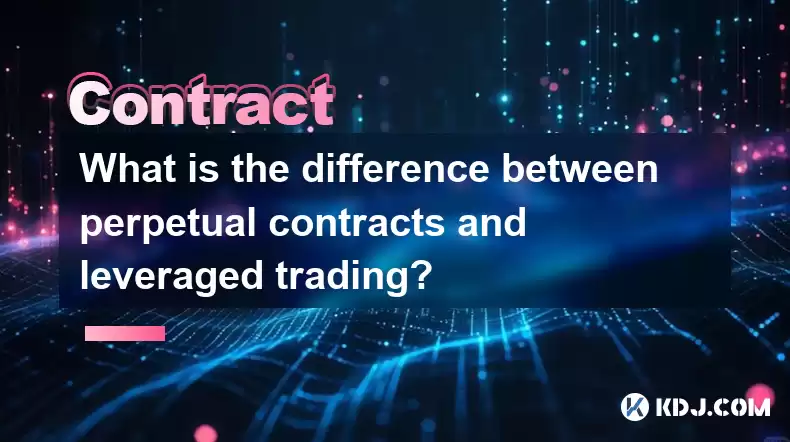
What is the Difference Between Perpetual Contracts and Leveraged Trading?
Introduction
Perpetual contracts and leveraged trading are two popular instruments for traders seeking to enhance their potential profits in the cryptocurrency market. Both instruments offer traders the ability to multiply their trading capital and amplify their returns, but they differ significantly in their underlying mechanisms, risk profiles, and implications for traders. Understanding the differences between these two instruments is crucial for traders navigating the complex landscape of crypto trading.
Perpetual Contracts: A Dive into Features and Mechanisms
- Definition: Perpetual contracts are financial instruments that mimic the price movements of an underlying asset (e.g., Bitcoin, Ethereum) without an expiration date. They enable traders to speculate on the future price of the underlying asset and adjust their positions indefinitely or until they decide to close their positions.
- Trading Mechanism: Unlike futures contracts with fixed settlement dates, perpetual contracts do not have a predetermined expiry. Traders maintain their positions indefinitely, and the contract price continuously tracks the spot price of the underlying asset with a funding mechanism.
- Funding Rate: Perpetual contracts utilize a funding rate to keep the contract price aligned with the spot price. When the contract price trades at a premium, the long position holders pay a funding fee to the short position holders, and vice versa. The funding rate incentivizes traders to keep the contract price close to the spot price.
- Settlement: Perpetual contracts do not expire and can be unwound at any time without incurring a settlement obligation. Traders can exit their positions by placing an opposite transaction to close their position.
Leveraged Trading: Understanding the Mechanics and Risks
- Definition: Leveraged trading involves using borrowed capital to enhance the potential returns on a trade. Traders can access leverage through a crypto exchange or platform, allowing them to trade with capital that exceeds their initial deposit.
- Trading Mechanism: When leveraged trading, traders borrow funds from the exchange to amplify the potential returns on their positions. The borrowed funds increase the trading capital, enabling traders to open larger positions than they could with their original capital.
- Margin Requirement: Leverage is not granted without risk assessment. Exchanges require traders to maintain a certain amount of funds in their accounts as collateral, known as the margin requirement. This margin serves as a buffer against potential losses and ensures the trader can cover any adverse price movements.
- Risk Implications: Leveraged trading magnifies both potential profits and losses. While leverage can amplify gains, it also exposes traders to the risk of substantial losses exceeding their initial capital. Traders must carefully manage their positions and risk exposure to mitigate potential losses.
Key Differences: Dissecting Perpetual Contracts and Leveraged Trading
- Expiration: Perpetual contracts do not have a set expiry date, while futures contracts have a predetermined expiry.
- Margin and Risk: Leverage in perpetual contracts is typically lower (usually around 5x-10x) compared to the typical leverage used in leveraged trading, which can range up to 100x or even higher. This difference stems from the fact that perpetual contracts do not require settlement and bear lower counterparty risk.
- Closing Mechanism: Perpetual contracts can be partially or fully closed at any time, whereas leveraged positions must be closed manually or through margin calls.
Similarities: Overlapping Aspects of Perpetual Contracts and Leveraged Trading
- Underlying Asset: Both instruments derive their value from the price movements of an underlying asset (e.g., Bitcoin, Ethereum).
- Profit Potential: Perpetual contracts and leveraged trading both provide traders with the opportunity to enhance their potential returns, amplifying both possible profits and losses.
- Risk Management: Traders must implement sound risk management strategies for both perpetual contracts and leveraged trading. This includes setting stop-loss points, monitoring market conditions, and adjusting positions accordingly.
Choosing the Right Instrument: Navigating the Trade-Offs
The choice between perpetual contracts and leveraged trading depends on a trader's risk tolerance, trading style, and market conditions.
- Perpetual Contracts: Favorable for traders seeking long-term exposure to an underlying asset without the constraints of a fixed expiry date. More suitable for experienced traders with a moderate risk tolerance.
- Leveraged Trading: Suitable for traders seeking amplified returns and the potential for quick profits. However, it comes with higher risk and is recommended for experienced traders with a high risk tolerance.
Conclusion
Perpetual contracts and leveraged trading offer unique mechanisms for traders to navigate the cryptocurrency market and enhance their potential returns. While both instruments involve risk, they cater to different trading styles and risk appetites. By understanding their fundamental differences and nuances, traders can make informed decisions and select the most appropriate instrument to suit their individual goals and circumstances.
Disclaimer:info@kdj.com
The information provided is not trading advice. kdj.com does not assume any responsibility for any investments made based on the information provided in this article. Cryptocurrencies are highly volatile and it is highly recommended that you invest with caution after thorough research!
If you believe that the content used on this website infringes your copyright, please contact us immediately (info@kdj.com) and we will delete it promptly.
- Bitcoin, CPI, and Market Fears: Navigating the Crypto Landscape
- 2025-08-12 15:10:13
- BTC Traders Eye ETH Targets as CPI Looms: A New York Minute
- 2025-08-12 15:10:13
- Ethereum, Cold Wallets, and Presales: What's Hot Now?
- 2025-08-12 15:30:12
- Bitcoin, XRP, and Monetary Alternatives: Navigating the Crypto Landscape in 2025
- 2025-08-12 15:30:12
- XRP Breakout Watch: Institutional Volume Signals Potential Surge
- 2025-08-12 15:35:19
- XRP, Market Cap, and Institutional Adoption: A New Era for Crypto?
- 2025-08-12 15:35:19
Related knowledge
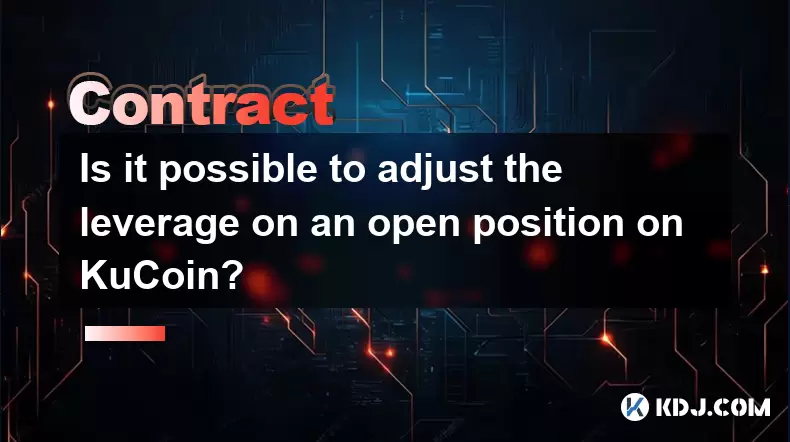
Is it possible to adjust the leverage on an open position on KuCoin?
Aug 09,2025 at 08:21pm
Understanding Leverage in KuCoin Futures TradingLeverage in KuCoin Futures allows traders to amplify their exposure to price movements by borrowing fu...
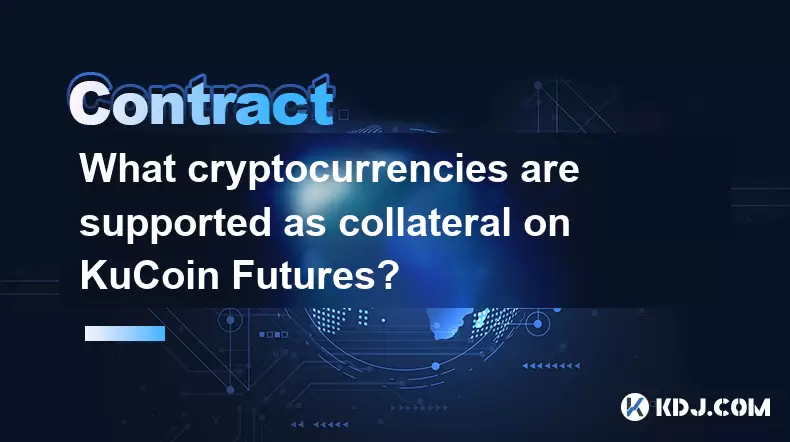
What cryptocurrencies are supported as collateral on KuCoin Futures?
Aug 11,2025 at 04:21am
Overview of KuCoin Futures and Collateral MechanismKuCoin Futures is a derivatives trading platform that allows users to trade perpetual and delivery ...
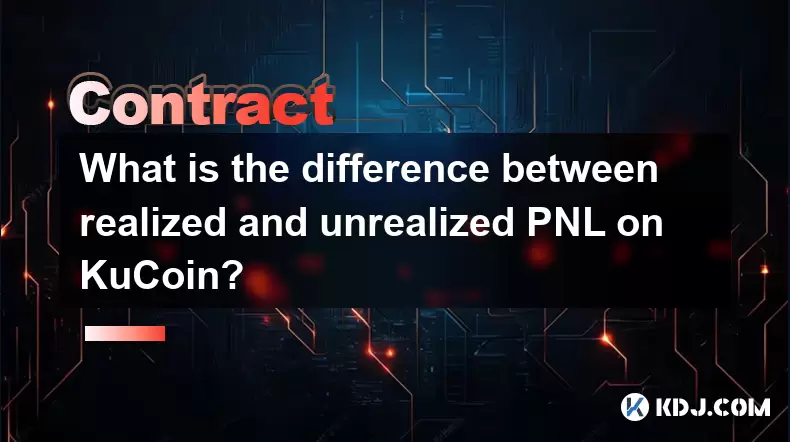
What is the difference between realized and unrealized PNL on KuCoin?
Aug 09,2025 at 01:49am
Understanding Realized and Unrealized PNL on KuCoinWhen trading on KuCoin, especially in futures and perpetual contracts, understanding the distinctio...
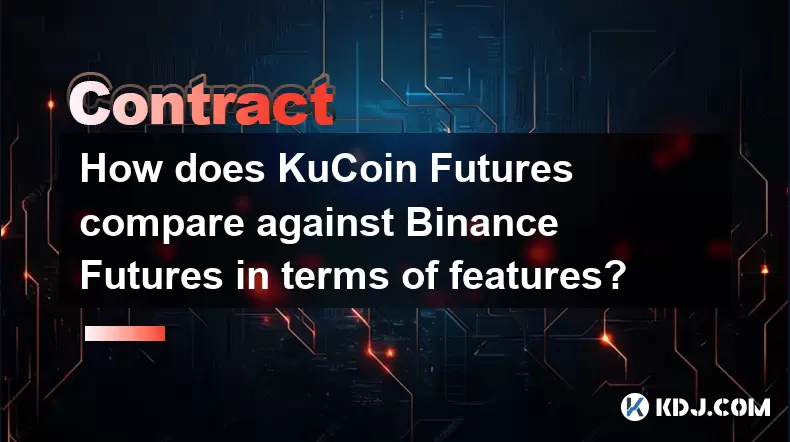
How does KuCoin Futures compare against Binance Futures in terms of features?
Aug 09,2025 at 03:22am
Trading Interface and User ExperienceThe trading interface is a critical component when comparing KuCoin Futures and Binance Futures, as it directly i...
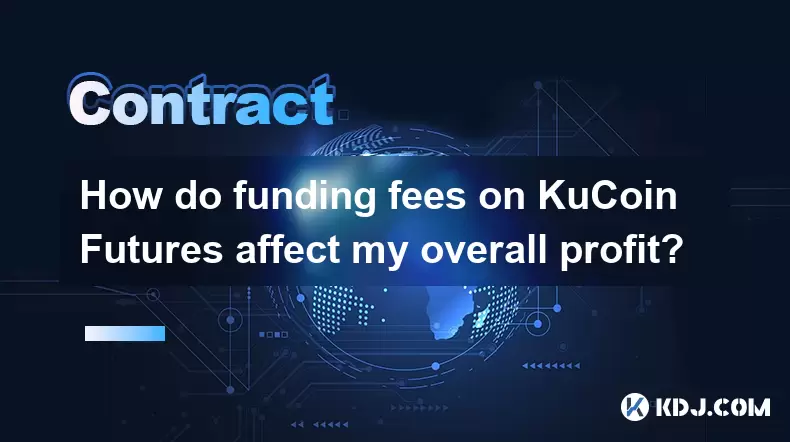
How do funding fees on KuCoin Futures affect my overall profit?
Aug 09,2025 at 08:22am
Understanding Funding Fees on KuCoin FuturesFunding fees on KuCoin Futures are periodic payments exchanged between long and short position holders to ...
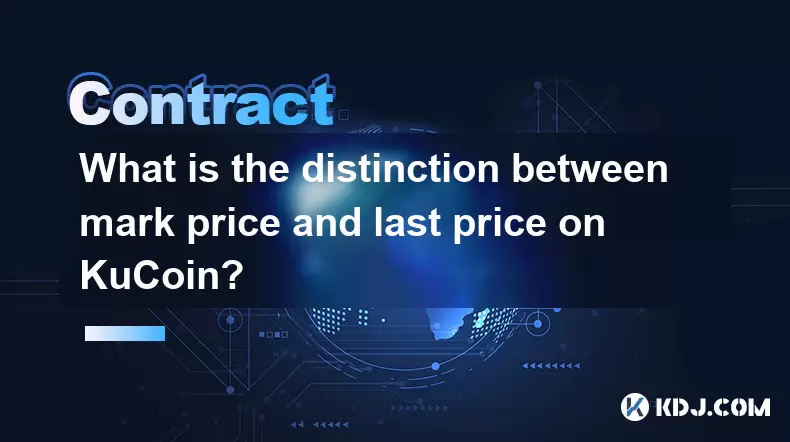
What is the distinction between mark price and last price on KuCoin?
Aug 08,2025 at 01:58pm
Understanding the Basics of Price in Cryptocurrency TradingIn cryptocurrency exchanges like KuCoin, two key price indicators frequently appear on trad...

Is it possible to adjust the leverage on an open position on KuCoin?
Aug 09,2025 at 08:21pm
Understanding Leverage in KuCoin Futures TradingLeverage in KuCoin Futures allows traders to amplify their exposure to price movements by borrowing fu...

What cryptocurrencies are supported as collateral on KuCoin Futures?
Aug 11,2025 at 04:21am
Overview of KuCoin Futures and Collateral MechanismKuCoin Futures is a derivatives trading platform that allows users to trade perpetual and delivery ...

What is the difference between realized and unrealized PNL on KuCoin?
Aug 09,2025 at 01:49am
Understanding Realized and Unrealized PNL on KuCoinWhen trading on KuCoin, especially in futures and perpetual contracts, understanding the distinctio...

How does KuCoin Futures compare against Binance Futures in terms of features?
Aug 09,2025 at 03:22am
Trading Interface and User ExperienceThe trading interface is a critical component when comparing KuCoin Futures and Binance Futures, as it directly i...

How do funding fees on KuCoin Futures affect my overall profit?
Aug 09,2025 at 08:22am
Understanding Funding Fees on KuCoin FuturesFunding fees on KuCoin Futures are periodic payments exchanged between long and short position holders to ...

What is the distinction between mark price and last price on KuCoin?
Aug 08,2025 at 01:58pm
Understanding the Basics of Price in Cryptocurrency TradingIn cryptocurrency exchanges like KuCoin, two key price indicators frequently appear on trad...
See all articles

























































































